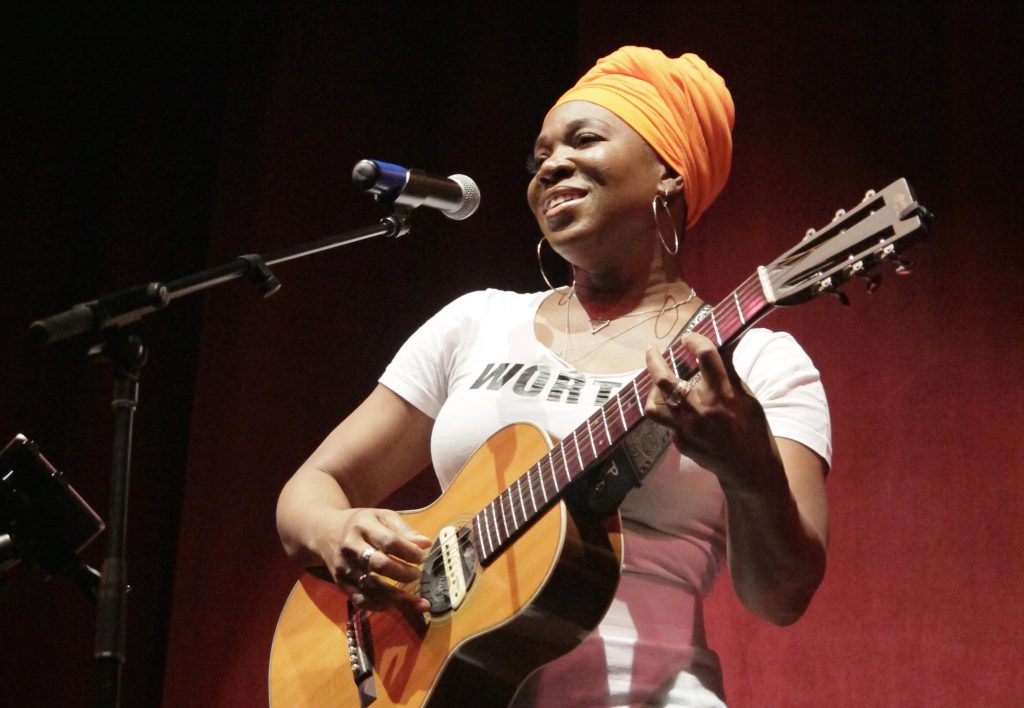
In honor of Black History Month, Grammy Award-winning musician India Arie spoke in Chamber Hall of the Anderson Center Friday night to discuss what it means to celebrate blackness unapologetically.
At the event hosted by Binghamton University’s Multicultural Resource Center and the Black Student Union (BSU), Arie delivered what she called a “songversation,” which is the name of her 2013 album. Arie explained that a “songversation” is not a song or a speech, but a unique relationship between speaker and audience. She encouraged an adjustment of breathing and posture, as well as chanting, to build that connection.
Arie started off the evening by discussing how she has dealt with being apologetically black in the music industry. She explained that the industry has its own hierarchy that is highly influenced by race and gender, and that as a black woman, she was expected to make a certain kind of music with certain kinds of messages and themes.
Arie said she forced herself to stay within these confines as she developed as an artist, but doing so made her physically ill and affected both her work and personal life. It was this entrapment that led to her four-year hiatus starting in 2009, after a successful career and a Grammy win for Best R&B Album in 2003 for “Voyage to India.”
“I learned that I am not here to perform blackness for anyone — I am black,” Arie said. “And I am not here to perform ‘woman-ness’ for anyone — I am a woman. And I wanted to live authentically … and I realized that if living an authentic life is outside the music industry, then so be it.”
During this time of searching for herself, Arie said she discovered that she is responsible for herself and her wellness, she is responsible for the energy she brings into the world, she is the highest authority in her life and she must define her own definition of success.
These realizations led Arie to embark on a journey to heal herself and embrace who she is. She said she sees apologizing for blackness as inherited through generations of blacks being put down as lesser in society. Now, Arie said she believes herself and all people to be unapologetically valuable.
“We’re all worthy, and we’re all significant and we all matter because we exist,” Arie said.
Joined by guitarist and long-time collaborator Blue Miller, Arie sang hits such as “Video,” “Brown Skin” and “I Am Not My Hair.” Before playing “I Am Not My Hair,” Arie recounted an incident in September when a black woman was denied a job because she would not cut her dreadlocks.
“In a society that tells you to apologize for your blackness by apologizing for your hair, in order to be empowered, you have to be able to embrace who you are and let go of who you are not,” Arie said.
Legan Bayombo, a senior majoring in industrial and systems engineering and the treasurer for BSU, said he was touched by Arie’s message of black positivity.
“A lot of the times we have to focus on the fact that we’re being black and focus on our plight,” Bayombo said. “It was really just mind-blowing, the opportunity to just listen to a message about more than that, more than just our plight.”
Toivo Asheeke, a fourth-year Ph.D. candidate studying sociology, said that he echoed these sentiments.
“You don’t have to be in protests and rallies and marches,” Asheeke said. “You can do different kinds of things and still make a contribution to people’s freedom.”
During the Q&A session at the end of the event, an audience member asked Arie what advice she would give to her 21-year-old self.
“Go forth, and be authentic,” Arie said.


